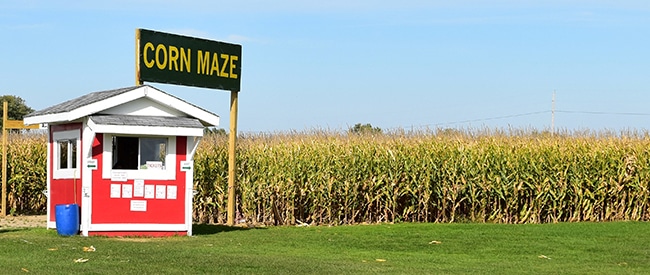Start Here for Insurance Coverage and Farm Diversification

Farmers may subsidize their operations with a side business to assist with profitability—and reduce the financial fluctuations that can occur when running an agricultural operation. Creating new businesses, or farm diversification, also means adding insurance coverage to protect yourself.
Many business ventures can be written under the main farm insurance policy for your operation. It is usually beneficial to combine insurance policies under one company too. Why? Well, one key benefit is, in the event of a loss, you are contacting just one company.
If you are diversifying the operations on your farm, always let your broker and insurance company know. Operations for a farm are clearly listed on your coverage summary page and anything not listed could mean you have no coverage in the event of a loss. You may also want to consider increasing the limits of your insurance and adding new coverages to support your new business.
Agritourism and Seasonal Farm Activities
Many farms are creating opportunities for urban dwellers to visit. This is called agritourism (also agrotourism) and the movement helps people see where their food actually comes from. It is a positive way to build relationships between farmers and the public. It can also help consumers understand farm processes and eliminate misunderstandings about agriculture.
Agritourism and seasonal farm activities may also be a bit less time-consuming than operating a year-round side business. Additionally, insurance coverage is only necessary for the length of time you operate. Examples include:
- Hosting special events on your property
- Creating a corn maze in August and September and charging an entry fee
- Hosting farm tours for the public and school groups to build understanding of agriculture
- Opening a u-pick pumpkin patch with hayrides and a small petting zoo for the month of October
- Hosting a sunflower festival in your flower field with food trucks and a small artisan market.
Secondary Farm Businesses
There may be opportunity for you to operate secondary businesses as part of your farm diversification plans such as:
- Making jams and preserves from the fruit on your farm
- Packaging unique cereal and granola mixes from the grains on your farm
- Selling your produce at a weekly farmers market
- Renting space for motorhome or boat storage
- Boarding horses
Farm businesses like the above may have additional liability exposures, especially when it involves manufacturing food. As always, contact your insurance broker to learn more and add appropriate coverages to your policy.
Home-based Businesses
You may have a home-based business separate from farming operations. However, that business can still be insured under your farm policy. Typically, an insurance company has guidelines for annual income from a home-based business and details on what businesses are accepted, for example:
- Accounting
- Alterations and sewing
- Bed and Breakfast
- Cleaning services
- Family photography
- Handicraft and hobby like knitting, candle making, and crochet
- Household good sales like Avon, Epicure, or Norwex
Short-Term Rentals
Many websites allow property owners to easily list a room or home for vacation rentals which can be a lucrative farm diversification tactic depending on the area you live in. However, having new guests every week will create a new exposure on your property. To ensure you understand how your insurance may respond in the event of a loss due to a short-term rental, reach out to your broker. Additional coverages may be available to support the unique risks of short-term rentals.

